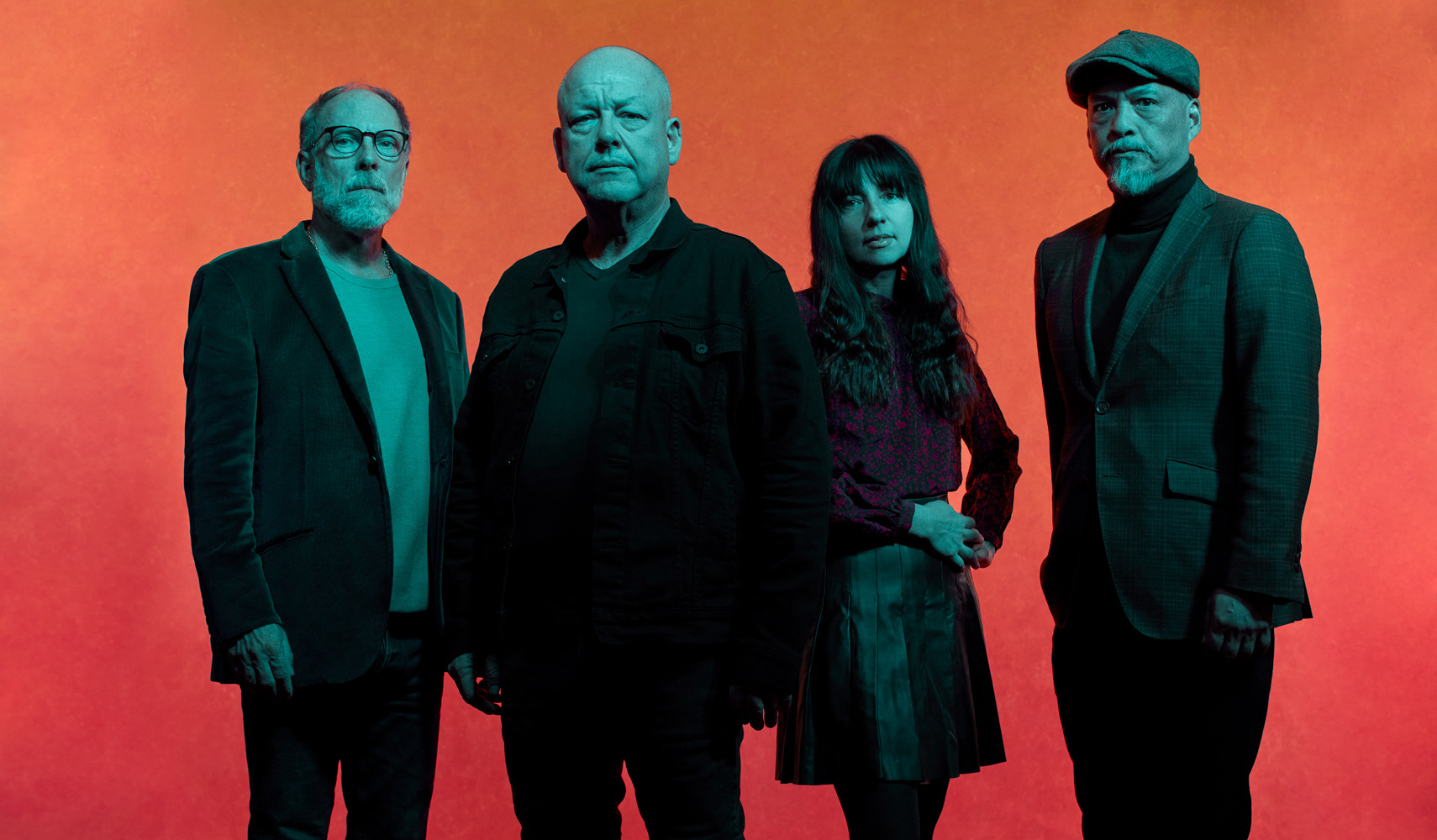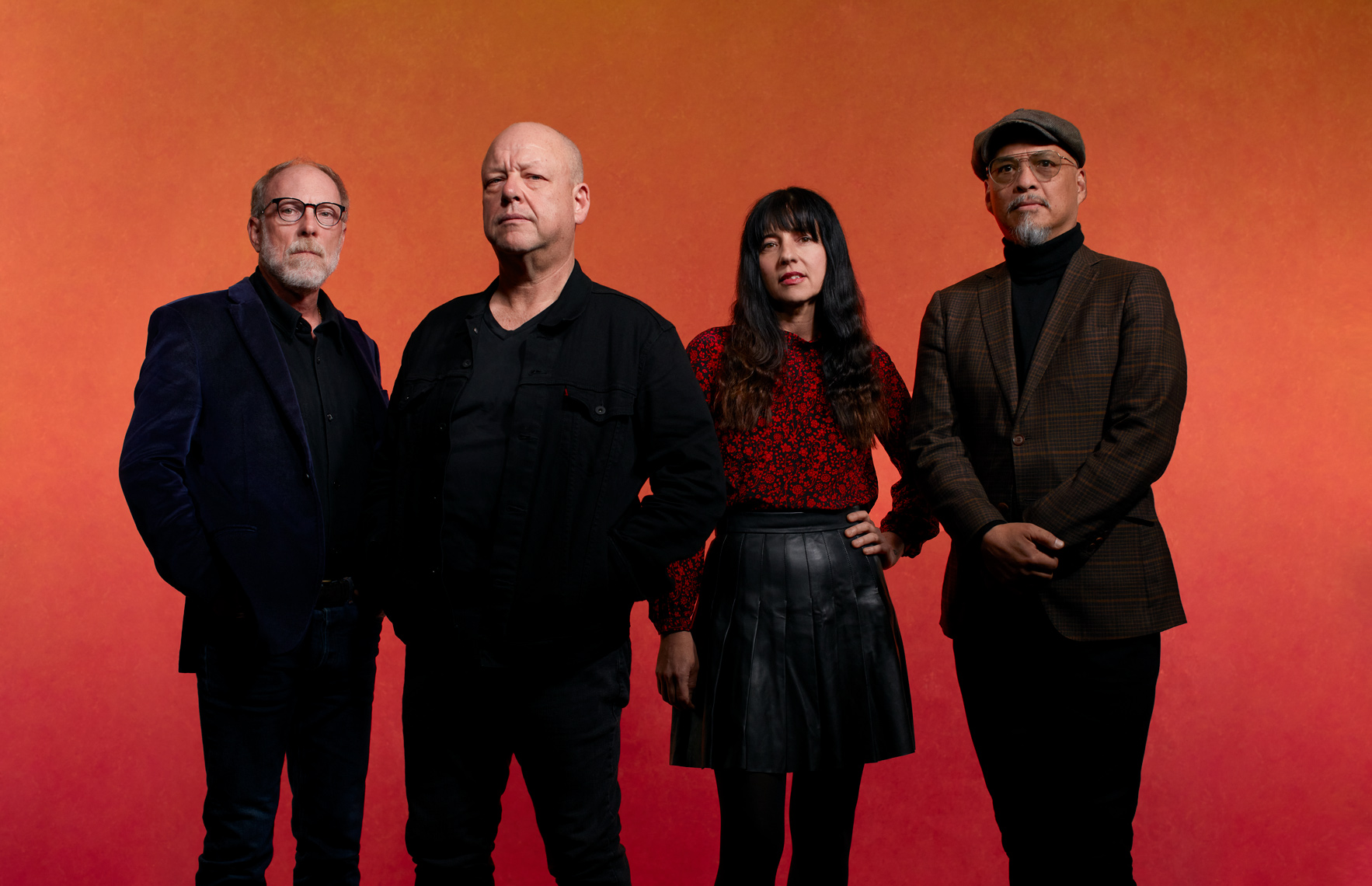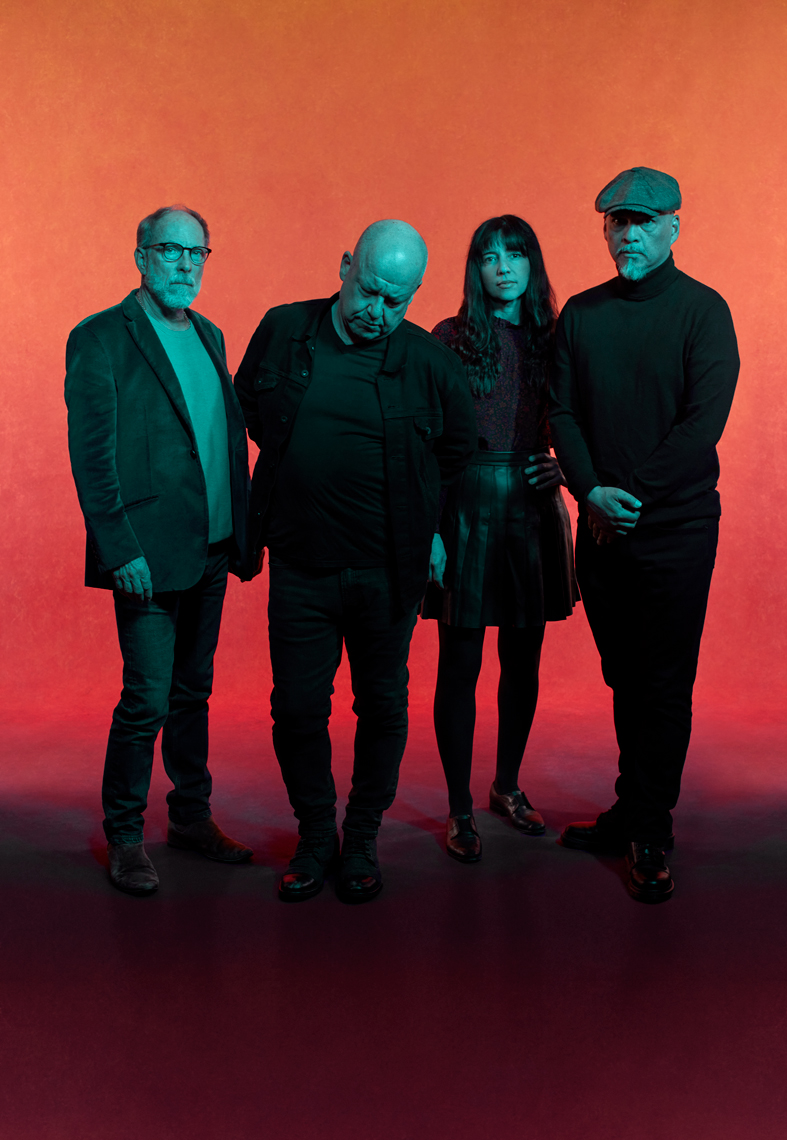
“There was this Rover on Mars. The computer broke down and NASA used ‘Where Is My Mind?’ to wake it up. I was like, ‘That’s it. I’m done!’.” Pixies drummer David Lovering is in full flow, sat in the air-conditioned bar of Manchester’s 500-capacity Band on the Wall venue, his eyes earnestly peeking out from beneath the hood of a baseball cap. As career high points go, it’s an anecdote that takes some beating.
In a few hours, alt-rock heroes Pixies will play their smallest UK show since the early nineties. For now, the band’s timekeeper is keen to shoot the breeze. “I haven’t been as excited about an album since Doolittle,” he enthuses in reference to forthcoming album, Doggerel. “Not to say I didn’t get excited with Bossanova or Trompe le Monde or Beneath the Eyrie, or anything like that,” he adds, “but this has kind of given me that same kind of excitement [as Doolittle]. I haven’t had that feeling in a while.”
Those who have soaked up the high-voltage clatter of catchy lead single ‘There’s A Moon On’ may sense that something special lies on the horizon. And they’d be right. Other post-reformation Pixies records may have offered tantalising flickers of former glories, but Doggerel feels like the real deal. It’s altogether a more cohesive work, the sound of an outfit firing furiously on all four cylinders.
Pixies remain an enigmatic musical conundrum. A band whose songs are part-enchanted forest, part-picket fence lawn, seductively seesawing between the conventional and the unconventional. In this sense, Doggerel offers a particularly strong set of seesawing tunes.

Idiosyncratic diversions are corralled by infectious hooks, and lyrical preoccupations are familiar but reassuringly provocative: Gothic drama, religious rumination and nihilistic proclamations going toe-to-toe for airtime. The likes of ‘Thunder & Lightning’, ‘There’s A Moon On’, ‘Dregs of Wine’, and ‘The Lord Has Come Back Today’ evidencing the delicious aural cocktail associated with their most beloved work.
Like so many of their peers, the group are emerging from a pandemic-enforced hibernation. In February, after two years apart, the four-piece decamped to an eco-studio in Vermont where heavy snowfall served the dual purpose of providing a picturesque vista and work-conducive isolation. “The experience was amazing. It was two years where we hadn’t done anything. We were all just working towards it. I think that the work paid off.” Helmed by returning producer Tom Dalgety, the group wrapped up the album in a double-quick period of “about three weeks”.
Although the pandemic instilled a hiatus-of-sorts, Pixies are well known for the two distinct chapters in their history, split by a decade of silence. Their celebrated first phase between 1988 and 1993 included a trio of albums in Come On, Pilgrim, Surfer Rosa and Doolittle that arguably formed the catechism for modern rock, dynamically directing and influencing the musical impulses of Nirvana, Radiohead, Weezer and many others.
As ever with such a fertile creative entity, tumult was a shadow that loomed large. Original bassist Kim Deal was temporarily fired in 1990 whilst she lay down tracks for the first album by her then side-project, The Breeders. The event was symbolic of the “horrible dysfunction” present at the time, according to Lovering. “We even went to the lawyer’s office. It was that messy.” Legal action “didn’t happen” in the end, he says with a huge dollop of relief, but that almost misses the point: “The thing is, it went there, which was horrible in hindsight.”

Thankfully, the group patched things up and, with Deal back on board, they quickly boxed-away the beguiling surf-rock of Bossanova and followed it up with Trompe Le Monde in 1992 before internecine squabbling finally poleaxed them for good in 1993. When asked if the Pixies breakup affected his mental health, Lovering is unequivocal: “Big time. This was something I knew and loved. It was my life, really. And it was taken away. I really didn’t know what to do.”
In a previous life, the drummer had trained as an electrical engineer, but he realised this “fallback” wasn’t particularly feasible having been out of the trade so long. “There were a lot of younger kids that could get a job doing that instead of me. It was hard. Should I just start working with my dad again? I just didn’t know.”
In the end, Lovering tried his hand at magic. “You’ve heard of the starving musician. Well, it’s the starving musician and a dying magician,” he chuckles. Its impact was nevertheless life-altering. “It changed me. In a band, I’ve got three people in front of me and I’m behind a drum kit. There was nothing to be nervous about with the Pixies, but when I did my first magic show it was in front of 10 people. Me alone. I could have rung my shirt out with sweat. Magic changed my life. I was shy before, and it gave me confidence.”
David Bowie once famously suggested that a ‘psychotic Beatles’ lay within Black Francis’s compositions. Bowie became such a Pixies champion that he not only covered Surfer Rosa’s ‘Cactus’ on 2002 album Heathen but when they flew over to the UK, he took them out to dinner. “He took us out to an Indian restaurant here in Manchester,” Lovering recalls. “At the end, he pulled out his credit card and it said ‘David Jones’! That was awesome. Bowie was always very vocal about us, and it was wonderful.”

Photo: Andi Callen
When the call finally came to get the band back together in 2003, Lovering was thrilled. “It was something I had loved, lost and got back,” he reflects fondly. The original line-up reunited and toured the globe, headlining festivals around the world, playing in front of crowds whose size would have seemed the stuff of fantasy before. Absence had made the heart grow fonder. Their legacy had grown, and their second coming was greeted like, well, The Second Coming.
Aside from the download-only 2004 single ‘Bam Thwok!’, new material was largely absent. Deal ducked out before their first comeback record Indie Cindy was recorded in 2013, her place briefly filled by Kim Shattuck of pop-punk outfit The Muffs. Her tenure lasted less than five months. Even today Lovering will only be drawn to say it was down to “differences”. “Different types of people,” he offers, tight-lipped over the minutiae. “As far as being cohesive as a unit and like a family, it was tough.”
Longstanding Pixies fan, onetime Billy Corgan cohort in Zwan and A Perfect Circle bassist, Paz Lenchantin, was a perfect fit. Lenchantin’s multi-instrumentalist abilities, not to mention her genial countenance, injected fresh energy into the group. And Lovering glows at the mere mention of her name, calling her a “wonderful musician”, a “good personality” and someone who makes him “play better”.
Speaking of playing better, the band’s live shows have long been dictated by impulse, with setlists abandoned in favour of a countdown clock. “It’s much more exciting and it’s more of an adventure,” muses the drummer. The band will agree on the opening song only and will see where it goes from there. “You get to read the audience. Charles has a mic that’s facing me that all of us can hear. The audience can’t hear it, but he can call a song, or maybe two songs that might go together. We’ve got it down to an art where we can pull it off onstage.”

Photo: Andi Callen
One thing that hasn’t changed is their onstage demeanour. Their gigs are a no-nonsense, music-only affair. On and offstage, Pixies tend to stay apolitical. One exception, however, springs to Lovering’s mind. “We were going to play in Israel once. We didn’t [in the end] because a flotilla was attacked,” he says, referring to the cancelled 2010 show due to accusations of Israeli state terrorism when a flotilla carrying Gaza-bound aid was attacked. “That was the first time I think we pulled a political thing and there was a lot of flak.” He starts to mildly chuckle. “I think Elton John called us pussies!”
When the band take to the Manchester stage in the evening, it’s as far from the remoteness of a Mars Rover as one can get. The venue is a sweaty, heaving mass of flesh packed into the tiniest of spaces, everyone jostling for a vantage point. The band don’t disappoint. They tear through indie monoliths such as ‘Monkey Gone to Heaven’, ‘Hey’, ‘Gigantic’, and ‘Gouge Away’, whilst giving a reasonable showcase of the new album as well as a swathe of deep cuts.
They may not engage in conversation with the audience, but there is no doubt this is a band united, in thrall to their unique musical maelstrom. It’s intoxicating and hypnotic. Witnessing it unfold, something David Lovering mentioned earlier rings in the ears. “I don’t take this lightly. I would like to remember all this. I haven’t in the past. Those two breaks (the band split and the coronavirus pandemic) have made me appreciate it more. And I want to remember this. I want to remember this when I’m old.”
Pixies don’t need NASA’s help to wake them up. Their eyes are wide open, vital as ever.
Doggerel is out on 30 September via BMG.




